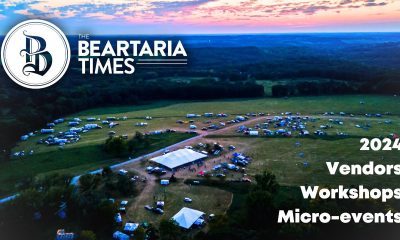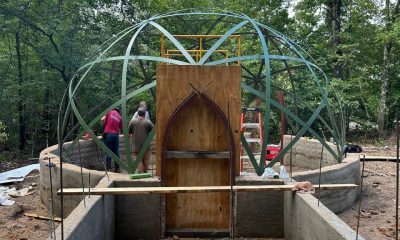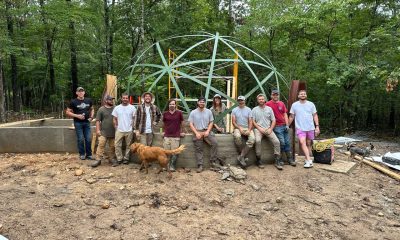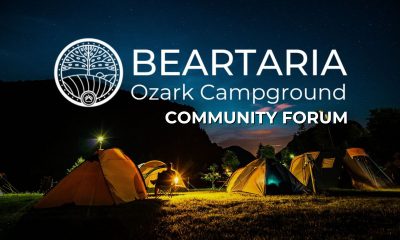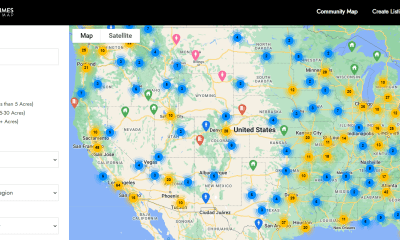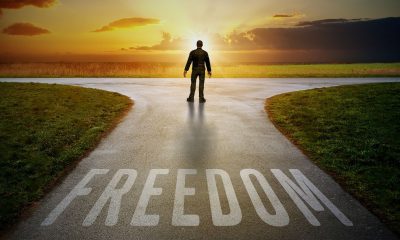Lifestyle
You Are What You Reflect
It is odd at times how life can take you down turns you would not expect…
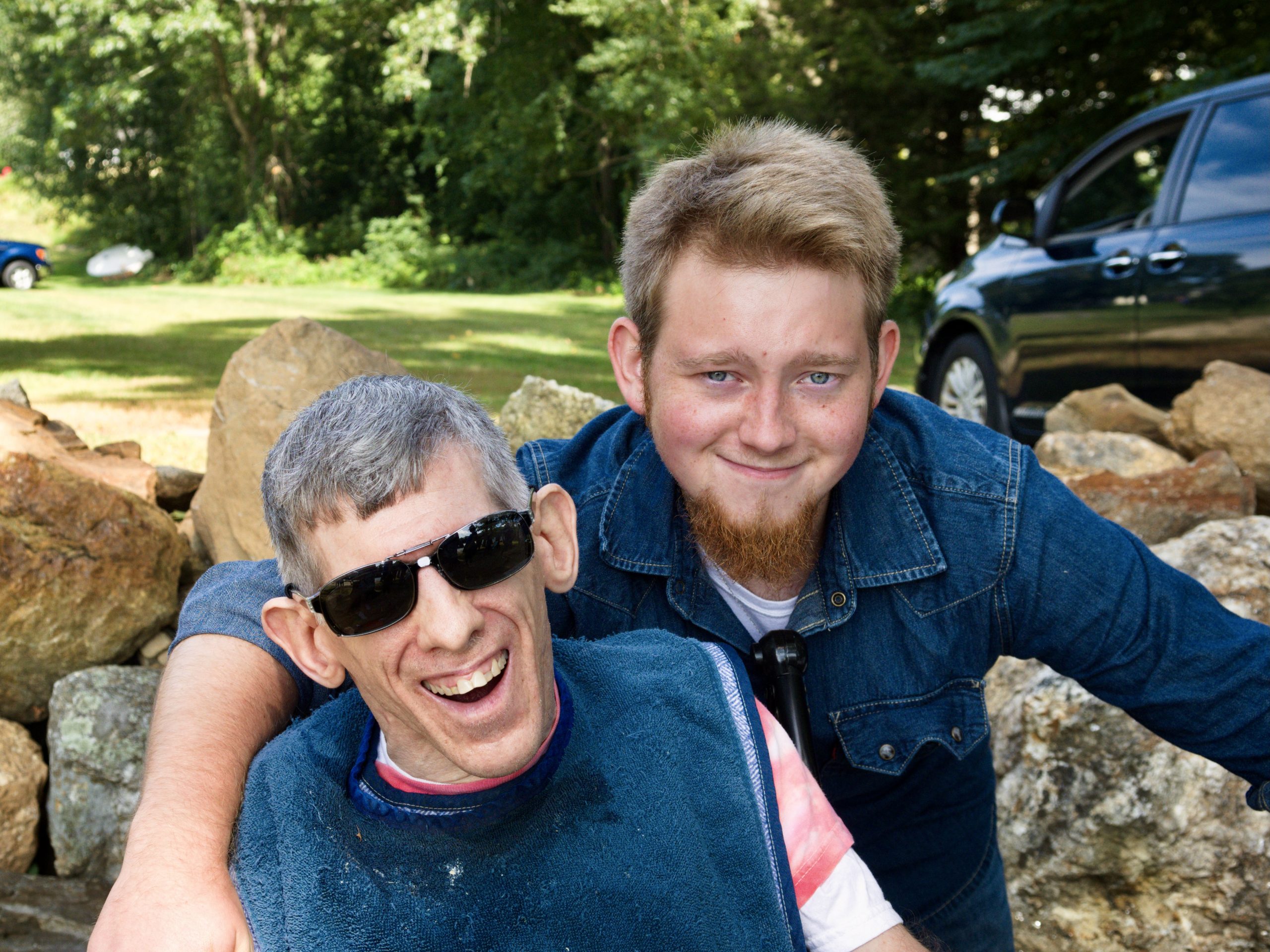
By: Ukrainian Bear

This article was first printed in our very first issue of The Beartaria Times Magazine, Origins, A Revealing of Legends
Ever since I was a little boy, I had been a curious little hobbit. Always getting lost trying to find something, whether it’s a wooden sword at a toy shop or a game of chess played by a couple old guys at the beach while my family frantically searches for me. I’ve always been searching, curious to look farther, and walk further. I think we all do this, to one degree or another.
Growing up as a child in Ukraine it seemed that everyone could do everything.
My grandfather worked in a chemical factory, served in the Soviet Army, learned to fix elevators to get cheaper rent, ongoing he fixed his own van to transport church goers from village to village, put in plumbing and radiant heating in the church that he had built from the ground up. My father is a musician by trade, fixes instruments of all sorts, knows how to work with sheetrock, independently learned 3 languages apart from Russian and Ukrainian which he fluently knew, repairs tiny electrical work found in most audio and video instrumentation, alongside my grandfather built up the same church they had been working on for 20+ years.
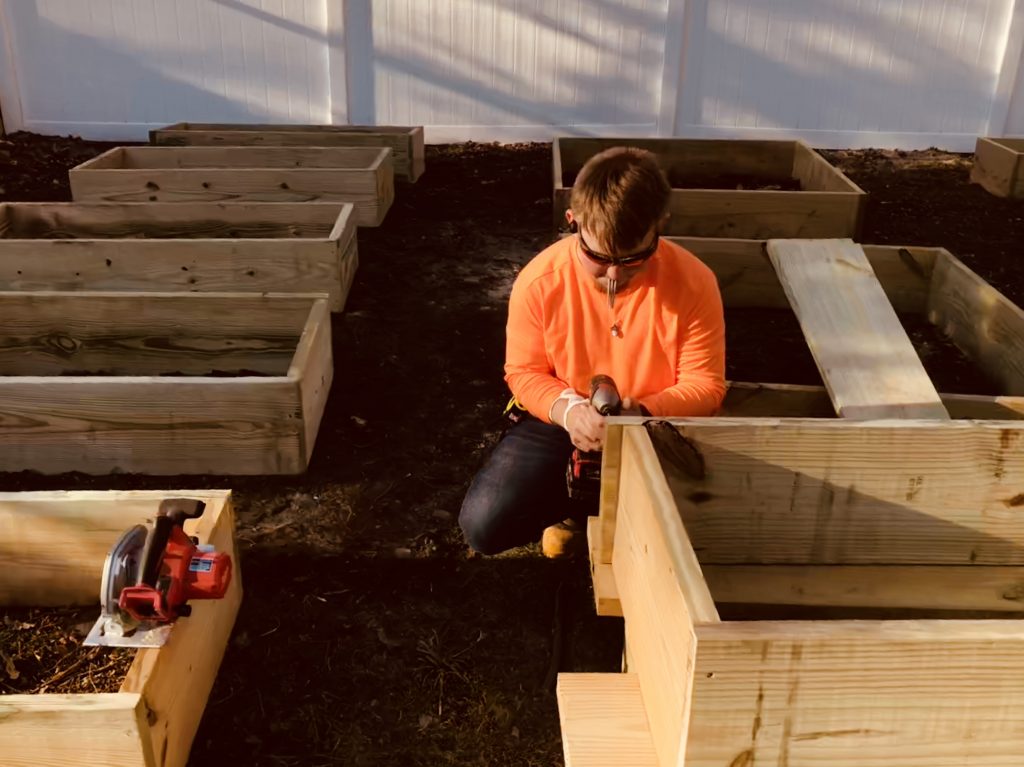
All the other members of the church I attended in Ukraine were just as talented. I guess I didn’t fall too far from the tree knowing how to use a medical ultrasound machine, take care of the handicapped, drive a tractor trailer, climb and take down trees with a chainsaw attached to my hip, learning to fix my chainsaws, tuning my own piano, and carving wooden bowls and little sculptures. The list will probably continue to grow, but I think my curiosity does have its limits. Even so, I didn’t come by my skills in one day and not without help.
Due to varying circumstances I had been living between America and Ukraine for a majority of my life. As such, I was able to come to understand the subtle and not so subtle differences between the cultures, as well as what makes its people what they are. In a high trust society, you can be certain a man will properly perform for a hired task, but in a low trust society you can only trust yourself to fix something, because someone is always looking to cheat you out of something, somehow.
Fundamentally, Ukraine is a low trust society where the people seem to have a wide range of skills. While they are poor, the low income breeds creativity with available tools. Low trust is created by the level of sin acceptance, which in turn creates struggle that is fertile ground for skill growth. It’s almost like a sine wave. The more sin acceptance there is in a society there will also exist an equal or proportional counter wave of skill necessity.
To put it in other words, the more people give in to sin, the more there arises an equal need for those individuals who can compensate for the skills lost to indulgence. This is not to say that having an immoral society is a good thing because it breeds industriousness, but that there is simply a greater need for people to be able to survive in their created environment. The way I explain the difference in culture is this: if an American stops at a red light and no one is around, he will wait until it turns green to go, but a Ukrainian will keep driving through a red light even if there are cars around. Morality starts with daily small, insignificant decisions.
After my mother divorced my father for whatever her reasons may have been and then remarried an American, I went on to grow up in Virginia as an 8 year old boy. There I was taught that I should work for my money and not have it handed to me like the rest of my friends around me at the time. So, I decided to take my family’s push lawn mower around the neighborhood and cut people’s grass. I was fairly successful and the people I did the work for were happy. Nothing like the smell of fresh cut grass in the summer.
When a very large snow storm hit Virginia and we had the week off from school. I took the opportunity to take all the shovels I had and recruit my friends to shovel people’s driveways. I just wanted people to have a clean driveway and spend time with my friends. We made quite a bit of money that day, but what I remember the most, even to this day, was how I was treated by the very last family that let us shovel their driveway.
They were a very nice older couple and they had given both my friend and I a cup of hot chocolate. The steam coming from the cup on a background of white snow and shaky wet hands was the best time I ever had. Working with a purpose and being appreciated for it. It’s pure, simple, and true. Couldn’t hide or cheat your way out of a shoveled driveway.
My teenage years didn’t lend themselves to having an abundance of diverse practical skills. Due to difficult circumstances in my mother’s life, she decided to send me back to Ukraine to live with my father and grandparents. I effectively didn’t know Russian or Ukrainian at that point, so having to go to high school right away, I had a lot of catching up to do. This difficult circumstance was just another opportunity to grow, and I did.
In the Ukrainian high school I attended, I was taught to be a linguistics and history major focusing on the English language, Ukrainian history, and WWII. I went to school 6 days a week, had multiple college level courses in biology, physics, chemistry, and literature; and most of my nights were spent studying these subjects. Most if not all the people in my class would go on to be political analysts, working for embassies, or occupying some part of government. These are the things we were being trained for.
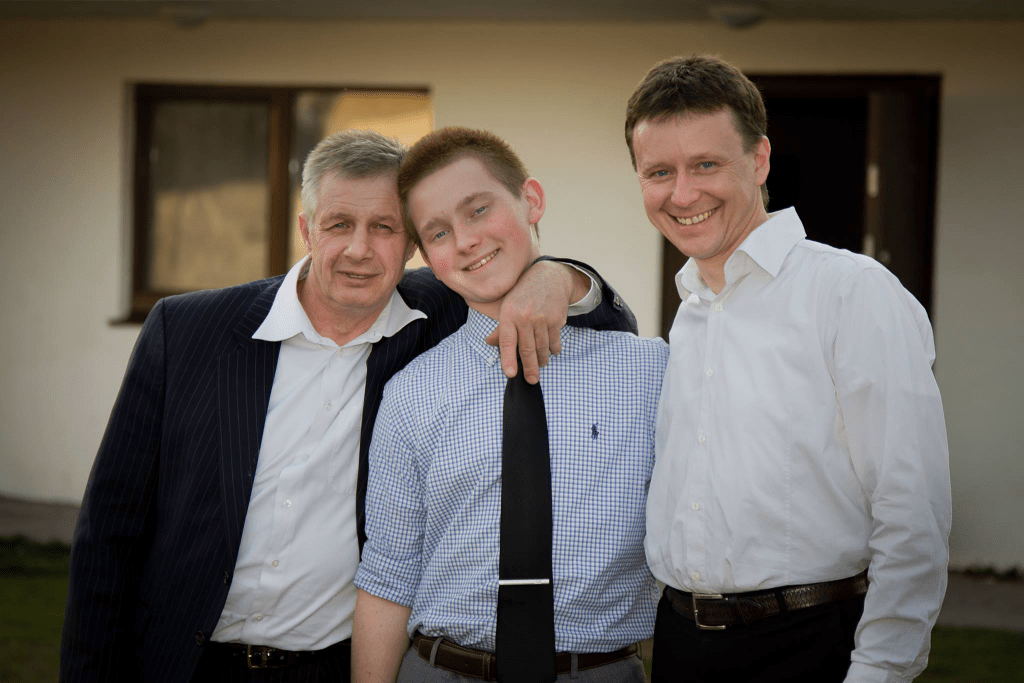
After 5 years invested in strenuous studying, this seemed fine to me. My grandfather said I would make a good ambassador someday, because of my character. Dealing with people, paperwork, and time constraints is all I had been doing, so it made sense to me at the time.
It was not until I returned to America, where I had spent a good portion of my preteen days, that I began to change my views on what I wanted to do with my life. While I wanted to make a positive difference in people’s lives, I found that working in politics was not the way I wanted to do it.
Having watched both of the important men in my life work with their hands, it did not seem foreign or beneath me to go work for a fence installation company to meet certain ends. I worked for the company for a brief 6 months, in which time I learned to install different kinds of fencing material. I’m certainly not a professional by any means, but I can put in a simple vinyl or wood fence post.
It is odd at times how life can take you down turns you would not expect. The very same man that hired me to install fences, guided me towards getting into the medical field. He told me that I should try it and that it would suit me, as it would have “been a shame to waste my intelligence” on simply putting up fences. After this I signed up for an EMT class at my local ambulance department where I eventually got my license. Having realized that I couldn’t earn much being an EMT, I decided to go to college and become an ultrasound technician (sonographer). Since I needed a steady job and wanted to pay for the program in full without incurring debt, I worked for a couple from my church that needed help with a family member that had several handicaps.
Thanks to the skills and license that I acquired prior as an EMT, I was able to get the job and have gained not only a steady income, but life-long friends, people that care and are good. To think back, it may have seemed that it was a waste of time to get my EMT license and I could have done something better with my time, but everything happens for a reason by God’s grace. As my grandfather would say, “There’s no such thing as just a coincidence”. Everything and everyone has their purpose.
I worked a full year while going to college taking my prerequisite classes. Earned all the money I needed for the program and was off to the races. I got accepted into a Diagnostic Medical Sonography program, which only accepted 12 students every year out of 100 applicants. I continued to work weekends at my job and went to school interning at various hospitals as part of the program. I was offered a job my first year in the 2 year medical program, which was unheard of. I told my program director that I had an interest in becoming a Surgical Physician Assistant. Per her recommendation, I spent a semester in a cadaver course, where I figured out that my skills with the scalpel were quite good. My program director was well connected in the medical field and desired to help me achieve my dream. She certainly had the means to make my aspirations come true having worked for Yale and being the top OB/GYN sonographer in the state, if not in the country. She had all the connections necessary and I had the drive, as well as the talent, to achieve this goal I had in mind.
The path seemed to be laid out before me. Go to college, study hard, preserver through late nights to come out the other end with a job that I could be proud of doing, because I knew that I was making a difference in people’s lives. Continue to work hard as a sonographer while saving money to pay for the next and final step, which would be the operating room, the pinnacle of American medicine. To be the man that could save another person’s life by sheer technique and comprehension of human anatomy. In my eyes this was a good path.
Around the year 2016, I had begun to notice subtle changes in American culture and attitude towards life. It appeared more indulgent, more accepting of sin, and less accepting of the truth. People seemed to complain more than they acted. Almost suddenly it became acceptable to go through a red light when no one was looking. But someone is always watching, even if you don’t see or acknowledge Him. The penalty for sin is death.
There had been many things that I encountered in the medical field that did not make sense to me. Why is it that even though America has the best healthcare system, the population is one of the unhealthiest? Why does a plastic (butt and cheeks) surgeon get paid more than a surgeon who can put together a leg that’s been ripped apart by a chainsaw? How can a doctor go from one room consoling a woman who just lost her 4th in vitro fertilization (IVF) baby, then go to another room where they plan the dismemberment of a healthy baby, as if the previous experience did not occur? The inconsistencies were all far too familiar. These things cannot last long under their own weight. I told several people whom I knew that there was a change coming to America. Most told me that I didn’t know what I was talking about, some just silently listened.
Around this time I found the comedian Owen Benjamin, who was talking about all the things I had been seeing, while no one else was. Interestingly, it was also around this time that I had a chainsaw accident that would propel me into a better future. I had to take 6 months off from my medical program and it was during this time that I intensely studied how to properly operate and fix chainsaws. I also learned how to climb trees and cut them down with various rigging equipment.
I thought I might want to go on to be a lineman as I learned to climb and found that I needed a commercial drivers license (CDL) to even be considered for an apprenticeship at a local union. I signed up with a local CDL school, paid in full to get into a fixed rate, because I saw the value in this and knew changes were coming. I don’t know why I did all these things at the time. It certainly seemed insane to my family at the time. I just had a feeling that this was important and the right thing to do.
Then 2019 hit everyone like a ton of bricks. I realized that I had to let go of my dream of becoming a surgeon. It was painful because I knew I could do it, but at what cost? Where do you stop and when? This was it for me. I knew now was the time to act, because the times are changing and so must I. All the hours spent on YouTube learning to climb, cut, and fix had finally begun to pay off. My medical program was following the lead of everyone else in the medical community, turning away from logic and reason. I knew there was no going back and that I couldn’t, with a clear conscience, work in the field.
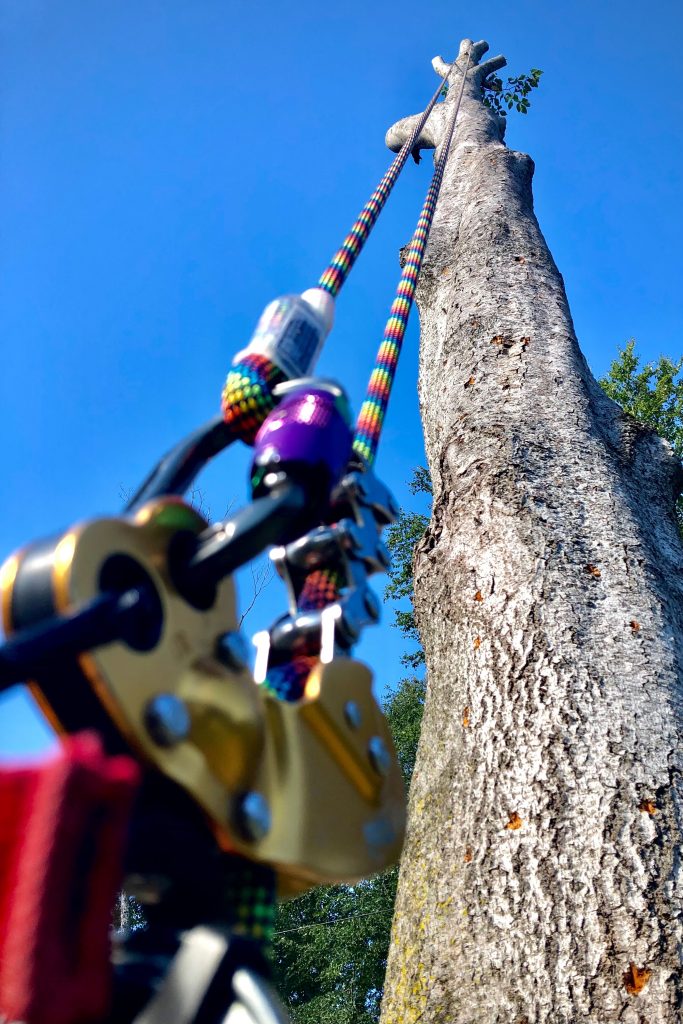
I finished the program in 2020 and got that paper I had worked so hard for. But I was already looking towards where I was going next. I saw many streams of ideas, like streams of invisible ribbons laying above my head, which I could grab on to. All leading further ahead into an unknown future, but with faith I am less fragile and can stand against the persistent winds of trial. Now I have my class A CDL and am currently clearing 3 acres of land for a friend of mine who wants to build a farm. This same friend also got me in contact with his brother who works for a crane company and I am in the process of getting a job there. Drivers and climbers are needed everywhere. There are plenty of open positions for the taking. All most people ask for is that you be honest, not drink, not do drugs, and show up on time.
While I was able to attain these skills and walk these paths, they would not have been possible without the generosity of people like my father and grandmother who sacrificed much of their time and money to put me through high school, my grandfather who spent many late nights talking with me about life and how a man ought to be, and the kindness of many strangers whom never knew me, yet shared their life with me. In a like fashion, I deal generously with what I have to others. It is better to give than to receive and it is good to help those you do not know, because even some have catered to angels. These acts are pleasing to God and such sacrifice He enjoys.
For those seeking to find a skill or to grow, my advice would be to seek the truth. You will be provided the skills and tools necessary to walk further than those who are not. It is my sincerest hope to be a humble reflection of the light that is poured into me, for what is a man without God and Jesus Christ? I hope it is yours as well.

Social media shows doomsayers, pessimists, and even truther-prepper types blasting out warnings of impending doom and gloom. You may feel the urge to fight if you can bear this without your emotions causing you to flee or freeze.
But what does fighting for your future mean? Unfortunately, much internet commentary directs your focus to what others are doing and how they affect you, calling for action to demand change. While this may have its place, it neglects the freedom we already possess and can inadvertently bypass our authority and control.
Here are a few simple things to think about that can help you fight against the future you don’t want, by building the future you do want.
Financial Future
Securing your financial stability is the cornerstone of building a successful future. This starts with becoming debt-free. Debt is a shackle that limits your freedom and ties you to a system you might not align with. Aim to clear your debts quickly and avoid taking on new ones.
Next, focus on land ownership. Owning land provides a place to call home and offers opportunities for self-sufficiency, such as gardening, raising livestock, or even setting up a small business. This autonomy can buffer against economic uncertainties and offer a sense of security.
Continually work towards a sustainable income. Whether through traditional employment, investments, freelancing, or entrepreneurial ventures, ensure your income sources are diversified and resilient to economic shifts. Build skills that are in demand and can be adapted to various roles. Financial independence is crucial in crafting a future you control rather than one external force dictates.
Education
Education is the foundation of personal and professional growth. Embrace self-study and continuous learning. The more skills and knowledge you acquire, the more adaptable you become in a rapidly changing world. Invest in personal improvement by setting aside time for reading, courses, and practical skill-building.
Homeschooling is another powerful tool. It allows you to tailor education to your family’s needs and values, ensuring your children learn what truly matters. Foster a love of learning in your household, emphasizing critical thinking, creativity, and practical skills over rote memorization.
Family Protection
Protecting your family goes beyond physical safety; it involves being a guiding force and a source of stability. We must also protect our families from negative and misguided influences. Be a leader to your children by setting a positive example. Teach them resilience, self-reliance, and the importance of moral values. Strengthen bonds with your siblings through support and cooperation, creating a solid familial network.
Honoring your seniors is equally essential. They possess invaluable wisdom and experience. Encourage intergenerational communication and respect, ensuring your family’s heritage and lessons are passed down.
Mindset
Your mindset is the driving force behind every action. Take ownership of your life and decisions, understanding that responsibility and accountability are keys to freedom. Respect your time and finances, recognizing them as finite resources that require careful management.
Develop a mindset of resilience and adaptability. Life is unpredictable, and being mentally prepared for challenges ensures you can face them head-on. Cultivate a positive outlook, focusing on solutions rather than problems. This proactive attitude will guide you in building the life you want.
Community Building
No one succeeds alone. Connect with people who share your values and vision. Building a community of like-minded individuals offers support, shared resources, and collective wisdom. Engage in activities and friendships that bring joy and complement your life.
We would like to take it a step further by saying, we don’t build the future we want as a reaction to the future we don’t want. We build, because we love, its fun and fulfilling. Our fight is to thrive, not to survive. Survival is a consequence of thriving. So aim high! Take control of your life, embrace self-responsibility, and connect with others on the same path.
Those looking to connect with a broader network should consider joining our Community app. It’s a platform dedicated to bringing together individuals who strive for independence. Whether you’re looking for advice, collaboration, or simply companionship on your journey, our thriving community is a valuable resource.
The power to shape your future is in your hands.
Lifestyle
Making Pine Needle Soda: A Fantastic Foraged Beverage
Pine needle soda, a truly one-of-a-kind beverage, has been savored worldwide for its zesty taste and health benefits.

Pine needle soda, a truly one-of-a-kind beverage, has been savored worldwide for its zesty taste and health benefits. It’s not just a refreshing drink, but also a creative use of natural ingredients. Here’s a simple guide to crafting this unique soda at home.
Pine needles are rich in antioxidants and vitamin C, which help boost the immune system. Different species of needles can offer different flavors, but it’s important to make sure the trees you harvest from are not toxic. Avoid using needles from yew, Norfolk Island pine, or Ponderosa pine. You should do additional research to insure you are staying safe.
The recipe I followed is easy and only requires a jar, strainer, and measuring cups. Start by identifying the pine tree you would like to harvest from; I used fir, tamarack, and white pine. Again, make sure you don’t use anything unsafe. You can choose to use new sprouted tips or even mature needles, which means you can also have fresh pine soda in the winter months!
You can scale up the recipe, but for reference, use the following:
- 2 Cups Pine needles
- 2 Cups Water
- 2-4 Tablespoons sugar (depending on sweetness you desire)
For the above measurements, I recommend using a quart jar. Begin by rinsing the needles, not too thoroughly, because the carbonation comes from natural yeast living on the pine needles. Add the sugar and water and seal the jar. Leave to ferment so it can become bubbly soda! Make sure to “burp” the jar every couple of days to release some of the gas so it does not build up and explode the jar! In 5-7 days, you will have soda, God willing.
Serve over ice and with some citrus if you’d like. Enjoy!
Lifestyle
Reconnect and Rejoice: Beartaria Times Weekly Challenge
Maintaining solid relationships with family and friends offers numerous benefits that enrich our lives in meaningful ways…

In our fast-paced world, losing touch with friends and family members who once played significant roles in our lives is easy. This week, the Beartaria Times invites you to participate in our heartwarming challenge: Reconnect with someone you haven’t spoken to in a while. Give them a call, ask how they’ve been, and rekindle that bond.
Maintaining solid relationships with family and friends offers numerous benefits that enrich our lives in meaningful ways:
1. Emotional Support: Close relationships provide a robust support system during tough times, offering comfort, advice, and a sense of belonging.
2. Improved Mental Health: Regular interactions with loved ones reduces feelings of loneliness and depression, contributing to mental well-being.
3. Increased Longevity: Studies have shown that strong social connections tend to help people live longer and enjoy better health.
4. Enhanced Happiness: Sharing moments, memories, and experiences with others brings joy and fulfillment, fostering a more positive outlook on life.
5. Personal Growth: Friends and family often challenge us to grow, learn, and become better versions of ourselves.
6. Creating Memories: Every interaction creates new memories, adding richness to our personal histories and offering stories to cherish for years to come.
We encourage you to take this challenge to heart and reach out to someone you miss. Whether it’s a friend from high school, a distant relative, or a former colleague, a simple phone call can reignite connections and brighten your day and theirs.
Once you’ve reconnected, share your stories and experiences on the Beartaria Times community app. Post about who you called, the memories you shared, and how the conversation went. Did you learn something new? Did you laugh about old times? These stories can inspire others to take similar steps in their lives.
Join us in this week’s challenge and celebrate the beauty of human connection. Let’s make an effort to nurture our relationships and remind those we care about that they are valued and remembered.
Happy connecting, Beartarians! We look forward to hearing your heartwarming stories.
Sincerly,
– The Beartaria Times Team
-

 Just Crushing2 weeks ago
Just Crushing2 weeks agoChristopher Gardner Completes First Dome Framing Project in Missouri: Exclusive Interview
-

 Just Crushing2 months ago
Just Crushing2 months agoBeartaria Ozark Campground Launches Community Forum!
-

 Just Crushing2 months ago
Just Crushing2 months agoMap it! – Discover Beartarians Living, Working, and Crushing Near You!
-

 Just Crushing2 months ago
Just Crushing2 months agoWhy Do We Feel So Free?
-

 Lifestyle2 months ago
Lifestyle2 months agoReconnect and Rejoice: Beartaria Times Weekly Challenge
-

 Reports2 months ago
Reports2 months agoReport: EF-1 Tornado Touches Down In The Ozarks
-

 Business2 months ago
Business2 months ago3000 Members In Our Business Group!: This Week On Our Community App!
-

 Wellness2 months ago
Wellness2 months agoBeartaria Times Member Shares History and Benefits of Haymaker’s Punch

